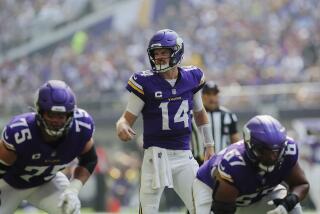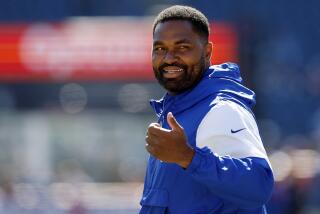21 Years to Instant Success : Pro football: Green made a quick impact on the Vikings after a roundabout trip to becoming their coach.
In his journey toward what he calls “the pinnacle,” Dennis Green has walked through a maze, over hills and around roadblocks and finally into the arms of the Minnesota Vikings.
It took him 21 years to get to Minneapolis. Then it took him about 21 days to make sure the trip would be worth it.
The result? In a startling turnaround, Green’s Vikings are leading the NFC Central Division with an 8-3 record as they go into Sunday’s game against the Rams.
But Green hardly pauses to look back at what he has accomplished.
After all, what’s the big deal about turning around the Vikings when you have spent five years and 45 losses at Northwestern, countless film hours as an NFL assistant and three high-profile seasons devoted to revitalizing a Stanford program?
For Green, this was the ultimate step in a career that has made football people think of him as a successful NFL head coach, not a successful NFL black head coach.
“Oh yeah, I think most people who know me would say that,” Green said this week. “My background’s like most other guys.
“I’m 43 years old, so I’m relatively young for a head coach in the National Football League, but I’ve been coaching for 21 years. I’ve coached at every level of college football, and I’ve been an assistant in the National Football League.
“My background is a coaching background--and not a black coaching background.”
Still, Green, who walked away from a Stanford head-coaching job so desirable that his mentor, Bill Walsh, replaced him, had to prove his stuff with the Vikings.
After 21 years, dating to his days in 1972 on the Iowa staff, this wasn’t the time to get cautious.
Green has said he realizes his role has been a trailblazer. He and the Raiders’ Art Shell are the only black head coaches in the NFL.
With the Vikings, who nearly imploded the last two seasons under the lax rule of Jerry Burns, Green made his presence known instantly.
“I’ll never forget,” said quarterback Sean Salisbury, “we went out there in the stretching lines--and we had in the past been a team that kind of goes through a stretch kind of half-witted and guys talk and some guys are still adjusting their shoulder pads and this and that. . . .
“And about 10 minutes into practice he called us all together and said, ‘That’s not the way the Vikings of 1992 play football.’ And we started practice all over again.
“Right then and there, everybody knew that this was the new sheriff and this was the boss, and we were going to do it his way and the right way or we weren’t going to do it all.”
Green didn’t simply make an attitude adjustment, player by player. He discarded four of the most talented but least motivated players.
He waived Herschel Walker, and nobody in Minnesota cried. He traded former All-Pro defensive tackle Keith Millard to the Seattle Seahawks for two draft picks. He got rid of safety Joey Browner and quarterback Wade Wilson.
“What we tried to do, I think, is make a realistic evaluation of the talent,” Green said. “We don’t worry too much about reputations or what happened five years ago or six years ago, but just try to determine where we’re at now.
“I think in turnaround programs, so often if you don’t really make the real tough decisions, then you don’t really make that much progress.”
Green says he didn’t dump the four players simply to make a point, but the result was a team changing its focus from catering to the stars to winning games.
“We didn’t come in and think we’re going to purge anybody at all,” Green said. “I think there is talent here. I felt there was talent here when you looked at it before, regardless if they all would be here or not.
“And I don’t mean superstar talent. I’m not sure what that word means anyway, to be honest with you, because when we had Jerry Rice with the 49ers, we didn’t call him superstar.
“We called him a damn good receiver, and that’s the way he played. And he didn’t require any excess baggage. He didn’t require any extra praise. He just played the game of football.
“That’s the kind of philosophy that we want to instill here: that what you do on the field’s really what counts, not how you’re perceived and not your reputation.”
On the field, third-year runner Terry Allen has emerged from Walker’s shadow and has gained 720 yards and scored seven touchdowns; defensive end Chris Doleman, under the prodding of defensive coordinator Tony Dungy and former Ram defensive line coach John Teerlinck, has awakened from a two-year hibernation to get 12 sacks, and quarterbacks Rich Gannon and Salisbury have played steadily.
The Vikings bolted to an undefeated exhibition season, then continued into the regular season, buoyed by their opportunistic defense. They are running away with the NFC Central.
It was, everybody acknowledges, addition by bold-minded subtraction.
Said Salisbury: “All those guys are capable of playing, but Coach Green, when he makes a decision, goes with it. He doesn’t apologize for it. He doesn’t think he needs to apologize for it, and he doesn’t.”
Green stays true to his no-nonsense approach when he is asked if he had a timetable for when he wanted to get the Vikings into the playoffs.
“You know, I came out of college football, and there, if you go to a bowl game . . . that means you had a successful season,” Green said. “And if you don’t, that means that you could say that it was improving, it was exciting, it could be a lot of things. But it can’t be successful without a bowl game.
“In pro football, it’s the same thing. . . . You could say they’ve got a new coach of the Vikings and he’s doing a pretty good job, or you could say they’re playing great defense and they score defensive touchdowns. You could say a lot of things.
“But if you’re in the playoffs, you had a successful season. If you’re not, you didn’t.”
More to Read
Go beyond the scoreboard
Get the latest on L.A.'s teams in the daily Sports Report newsletter.
You may occasionally receive promotional content from the Los Angeles Times.










